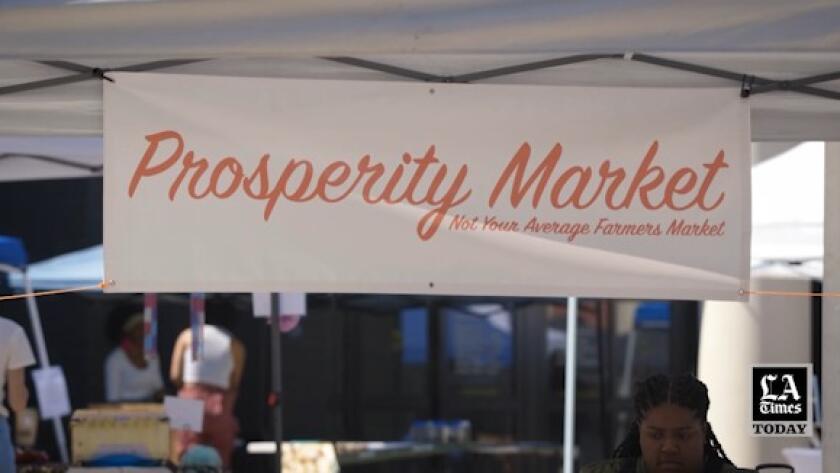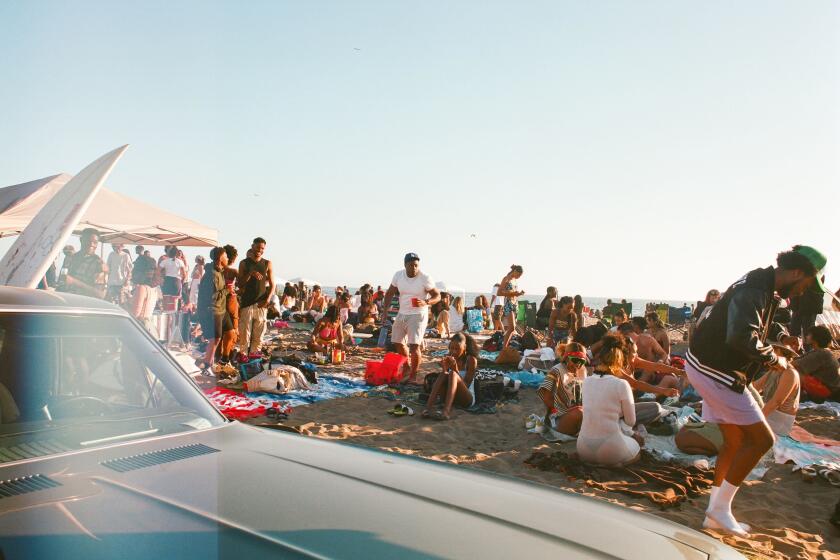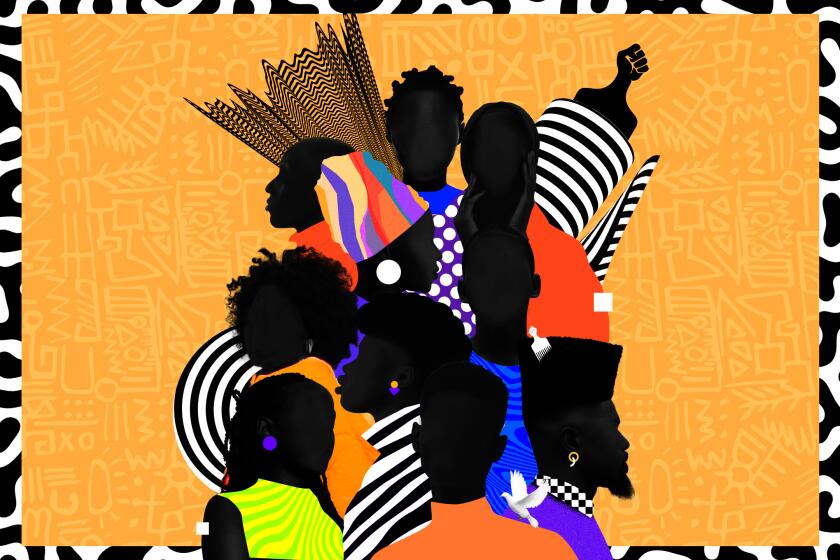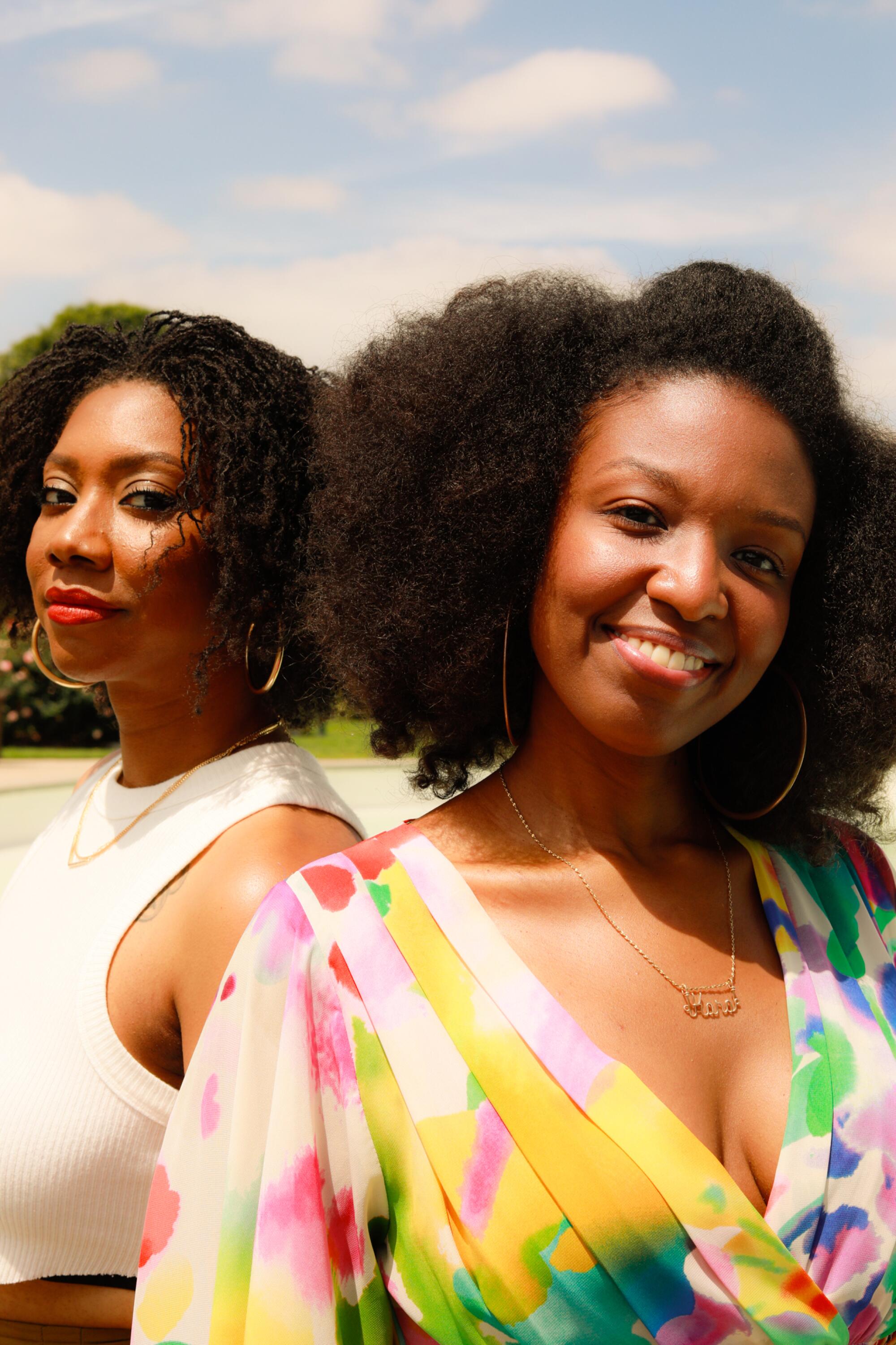
Prosperity Market has liberation baked into its DNA. Conceived by Carmen Dianne, 33, and Kara Still, 38, in June 2020 and launched in February 2021, the market was created to nourish the community from the inside out. For Juneteenth, Prosperity Market is partnering with the California African American Museum for a pop-up market from 11 a.m. to 3 p.m. June 19. (For anyone who can’t make it, there’s a virtual market running all week, through June 17.) This letter to Los Angeles, as told to Ian F. Blair, commemorates the celebration of freedom from slavery and outlines the duo’s vision for why this kind of work is so vital. With Prosperity Market, the thread of freedom runs through every artery of the operation. As they note, “There’s this thread of freedom throughout the entire thing. This is literally what we represent — the freedom to be able to support and sustain yourself and make it accessible to everyone.”
Dear Los Angeles,
It has changed very much. But the concept has stayed the same: to provide food from Black producers to everyone.
People have told us — they’ve not experienced a marketplace like this. Prosperity Market is a vibe. Prosperity Market is a safe space. It’s a space of joy and love and fun. It feels like family. Whether it’s like the love or the intention or this intangible something people get while they’re there. We have farmers, food producers, packaged food, hot food. We always have music. We have a DJ. I would say we’re like 70% food, and then we have 30% artists. Sometimes we’ll have children’s events. We do raffles. We’ll bring in community partners. It really is about creating a space where people can have access to all of these goods via all of these Black producers and be together. A space for people to be together and to learn stuff and try some new things.
Watch L.A. Times Today at 7 p.m. on Spectrum News 1 on Channel 1 or live stream on the Spectrum News App. Palos Verdes Peninsula and Orange County viewers can watch on Cox Systems on channel 99.
Ebony Beach Club shows why partying is a restorative practice. Whether you’re in need of healing from witnessing or experiencing pain — in the world, in yourself — celebration offers a clean slate.
Education is a big part of Prosperity Market. People learn. Our vendors are so knowledgeable. The farmers share things because, you know, it’s a farmers market. What they have changes seasonally. So they’ll share information about what they’re selling, ways to prepare it, ways to grow produce. We want to be able to educate people about food, about taking care of themselves.
And we want to educate ourselves. With Prosperity Market, we are learning from the people who are growing the food. Gail Myers of Farms to Grow. Jamiah Hargins of Crop Swap LA and Asante Microfarm. Temu Asyr Bey of Compton Community Garden. They’re telling us what this is and how to use it. And that’s very different from going into the grocery store and getting food. It’s just a totally different experience.
The person working in the grocery store doesn’t know where that food came from. They can’t say, “I harvested this this morning.”
It just feels good to be like, “I know who grew this. It came out of the ground two days ago.” There’s something about the connection to the food, knowing the story of it, or who grew it that actually enhances the experience of it.
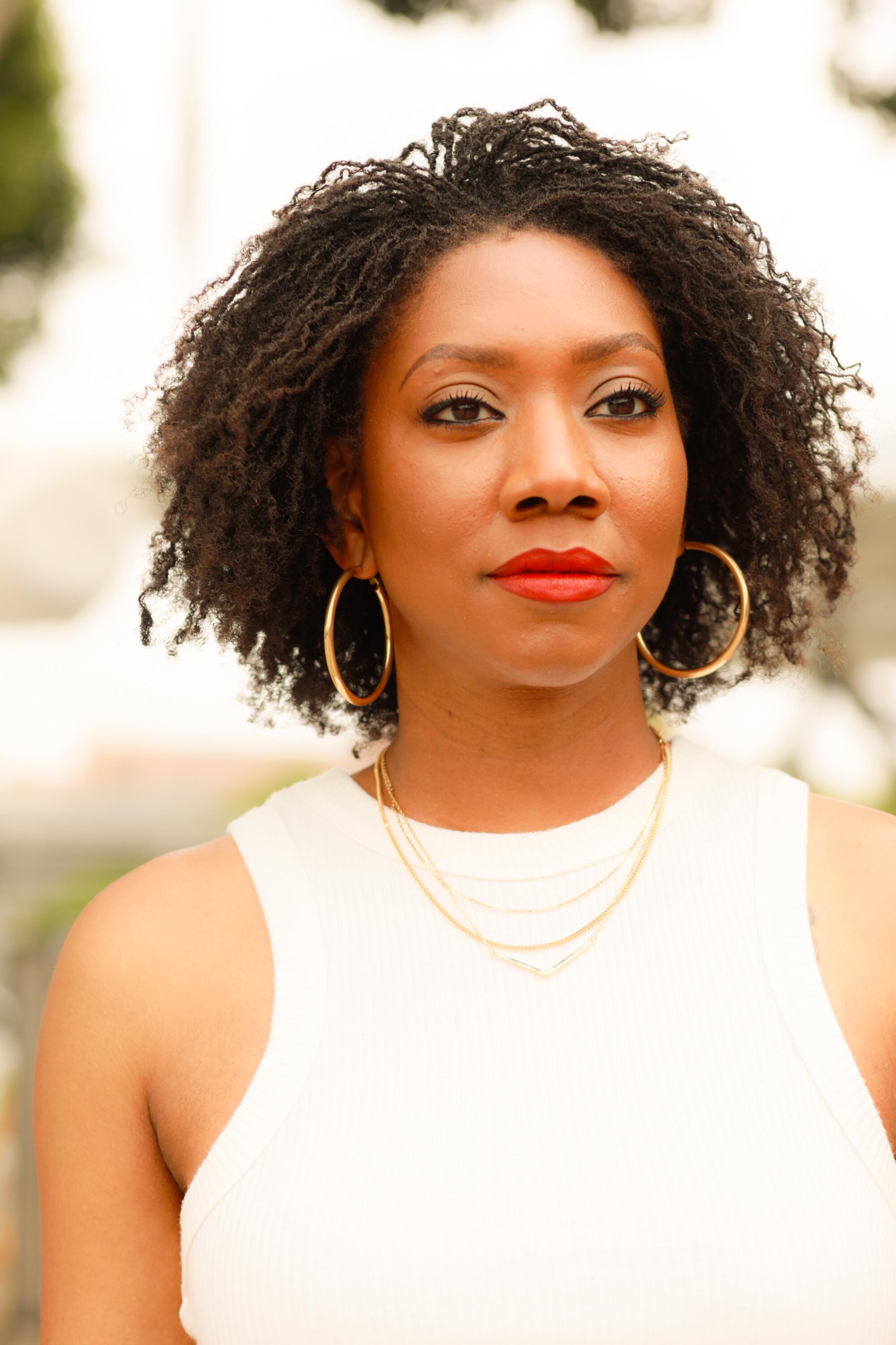
Neither one of us is a fan of cooking. It’s not our favorite. But picking the food, you get inspired to go home and cook it. Like, “Oh, my gosh. I picked this menu.” And it’s so good. And it’s so fun. There’s a connection to it — not like when you’re buying it from this box off the shelf. It’s like getting excited about going to the mall to purchase a pair of shoes. We can get excited about touching food in that way.
The other thing that is really empowering is to know that we could do this — like, “I could grow this myself. And I don’t even need space. I can rent a plot at the community garden.” Just knowing that it is accessible and that it doesn’t have to be expensive is powerful. Organic has this high price value. There’s this barrier — food is produced in a place, and we go buy it — but actually, we could all grow it because the seeds and the land do that. It happens naturally. Something truly organic is just not grown with pesticides. None of our farmers uses pesticides or chemicals.
These letters are part of Image issue 7, “Survival,” a collective vision for the L.A. of our dreams.
Food justice to us is everybody having access to healthful, affordable food. Being able to get it from Black farmers is another layer to that justice, because now it’s economic as well. So I’m really happy that we found this way to merge both. Something that we represent, that we stand for is freedom, accessibility. Being able to sustain yourself represents freedom, because you’re not beholden to someone else to feed you. You create a life for yourself.
Juneteenth is the celebration of freedom from slavery. So there’s this thread of freedom throughout the entire thing. This is literally what we represent — the freedom to be able to support and sustain yourself and make it accessible to everyone.
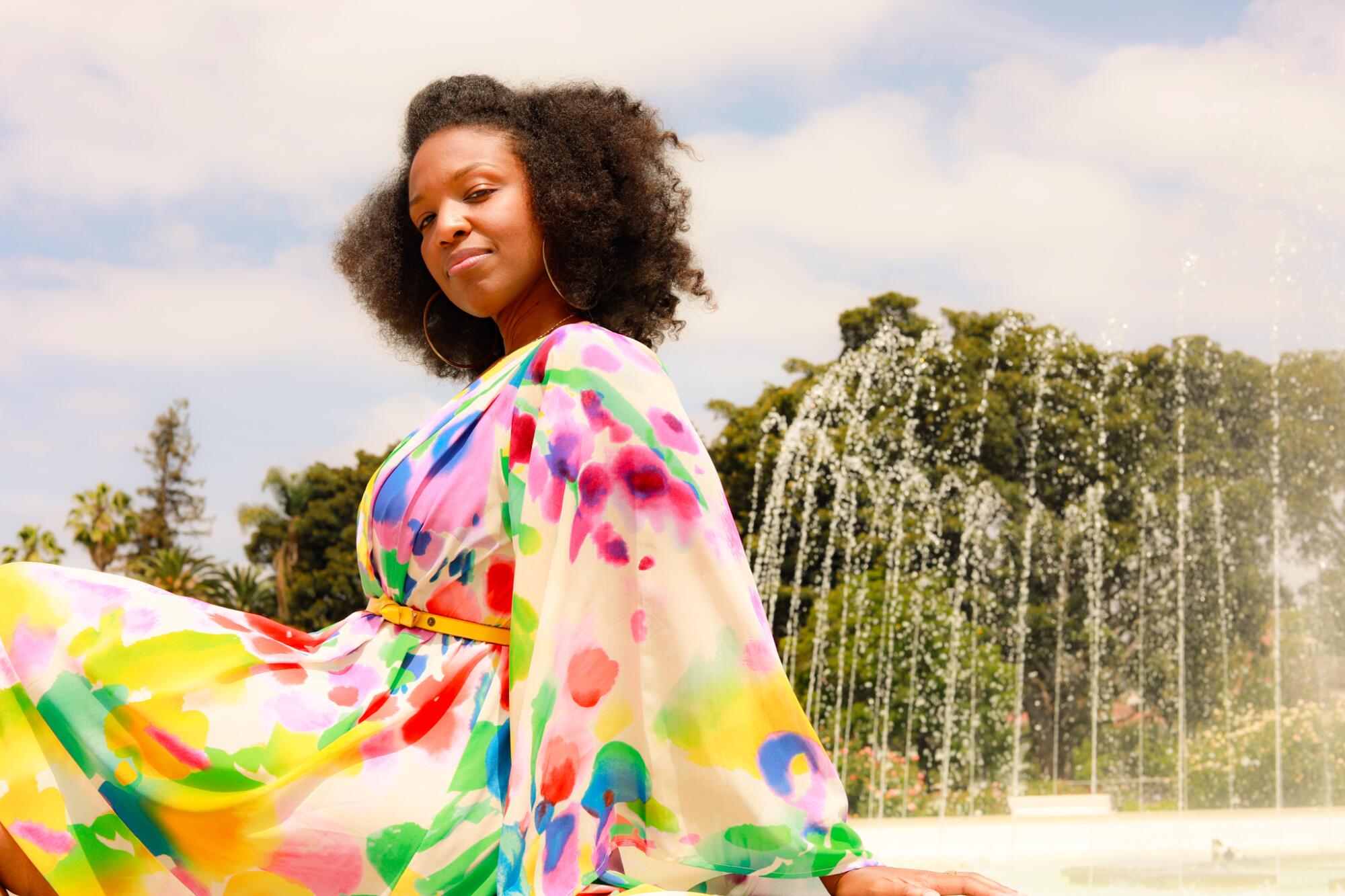
It’s been such an honor for people (our farmers, producers, community) to allow us into their spaces.
Thank you for making space for us to be partners.
Thank you for doing what you’re doing, even when no one is recognizing it.
Thank you for your commitment and for being willing to do the work, no matter what. It is not easy on any level.
Juneteenth 2021: This is how Black L.A. is celebrating
Our farmers and vendors have really made this whole idea real for us. It went from theoretical to real life the minute we had real people and businesses like Farmer Ken or Briann and Ray and their beautiful family from Here We Gro gardens. When you have actual faces behind your work, you go harder. We want Gloria from Gloria’s Shito to sell out. We want Maddy and Mariah of Maddy Bear Bakes to get a bunch of wholesale orders. We want everyone to experience a delicious salad from Toss It Up Salad or great coffee from the California Coffee Co. If Kara and I can do anything to help a vendor like Terrance from Happi Jam with pricing or get Blacker the Berry Juicery into local retail, we are going to do it. We want the world to know about how delicious Nekia Hatley’s mac & cheese is from My Daddy’s Recipes, or how amazing Gorilla Grub’s cobblers and vegan Thai curry is.
We are really proud of every single one of our vendors, and we stand behind them.
In prosperity,
Carmen & Kara
